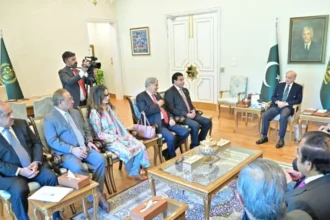TIANJIN: The Shanghai Cooperation Organization (SCO) has opened its largest-ever summit in the Chinese port city of Tianjin, where Chinese President Xi Jinping urged member states to embrace the “Shanghai Spirit” and work toward a fairer, more prosperous global order.
The two-day gathering marks a milestone in the 24-year journey of the SCO, which began in 2001 and has since expanded into a powerful regional platform for geopolitical cooperation, economic integration, and security partnerships. With leaders and delegations from across Asia, Europe, and the Middle East, the 2025 summit is being described as the most inclusive in the bloc’s history.
A Pivotal Turning Point
In his keynote address, President Xi emphasized that the Tianjin summit comes at a critical juncture as the world faces rising geopolitical tensions, energy security challenges, and post-pandemic economic recovery struggles.
“The SCO must remain true to its founding principles of equality, inclusiveness, and mutual benefit,” Xi said. “Our path is not one of confrontation or domination, but of shared prosperity and regional stability.”
He stressed that the organization should act as a stabilizing force in global politics, encouraging members to reject unilateralism and build a “community of shared future for mankind.”
Security as the Foundation
Security cooperation has long been the backbone of the SCO, originally founded as a regional security alliance among China, Russia, and Central Asian states. Today, security remains a defining feature of the bloc’s agenda.
Xi reiterated that “real security is built on mutual trust and collective responsibility,” warning against approaches that undermine the sovereignty of others.
Over the years, SCO members have intensified counter-terrorism operations, intelligence-sharing networks, and cross-border policing against drug trafficking and cybercrime. According to SCO data, more than 1,400 extremist and terrorism-related plots have been foiled since its inception.
This year, Xi urged deeper cooperation in emerging security threats, including cybersecurity, biosecurity, artificial intelligence governance, and outer space safety — areas increasingly crucial to modern global security.
Development as the Master Key
While security anchors the SCO, economic cooperation is becoming its driving engine. Xi noted that “development is the ultimate form of security” and called for stronger economic integration across Eurasia.
China’s Belt and Road Initiative (BRI) remains closely aligned with the SCO’s mission, with major infrastructure projects transforming regional connectivity. Xi highlighted the China-Kyrgyzstan-Uzbekistan railway, now under construction, as a flagship corridor that will link Central Asia to global trade networks.
Bilateral trade between China and SCO nations reached a record $890 billion in 2023, accounting for nearly 15% of China’s total foreign trade. Analysts expect further growth as the Tianjin summit is set to finalize agreements on digital economy partnerships, renewable energy cooperation, artificial intelligence innovation, and e-commerce expansion.
The summit will also adopt the SCO’s 10-year development strategy (2025–2035), focusing on sustainable development, green energy, and inclusive economic growth.
Equality and Inclusiveness
A hallmark of the SCO is its principle of equality among nations. President Xi underscored that “every member state, big or small, has an equal voice at the table.”
This approach has guided the SCO’s expansion, which now includes India, Pakistan, Iran, and Belarus alongside 14 dialogue partners and two observer states. Collectively, the bloc represents half of the world’s population and one-quarter of global GDP.
Xi also encouraged enhanced people-to-people exchanges, cultural diplomacy, and education partnerships, citing Silk Road heritage projects, academic collaborations, and youth exchange programs as vital tools for building long-term solidarity.
China’s Leadership Role
As the current SCO rotating chair, China has hosted more than 100 events over the past year under the theme of “Sustainable Development.” These included high-level discussions on green energy security, food sustainability, and digital transformation.
At the Tianjin summit, Xi is expected to announce new initiatives, including:
-
A clean energy cooperation fund for SCO countries.
-
Expanded scholarship programs for youth across the region.
-
Strengthened frameworks for agricultural technology and water security.
“China will continue to serve as a reliable partner, sharing opportunities and responsibilities with all SCO members,” Xi said.
Toward a Multipolar Global Order
Xi’s remarks also carried a broader geopolitical message: the SCO should serve as a counterbalance to power politics and Cold War-style blocs. He called for greater resistance to protectionism, unilateral sanctions, and trade barriers, instead advocating for multipolarity, global governance reform, and South-South cooperation.
“The future of global governance must not be dictated by a few nations,” Xi declared. “It must reflect the voices of the many.”
Observers say the SCO is increasingly positioning itself as the collective voice of the Global South, pushing for a fairer distribution of resources and influence in international institutions.
Looking Ahead
As the summit enters its second day, leaders are expected to finalize the Tianjin Declaration, a blueprint that will guide SCO cooperation for the next decade. Key areas under discussion include climate change policy, digital innovation, renewable energy development, and expanding SCO’s open-door membership policy.
From a modest beginning as a security dialogue forum, the SCO has evolved into one of the most influential regional organizations in the world, shaping the balance of power across Eurasia.
“Together, we have the power to shape a more just, inclusive, and prosperous future,” Xi concluded. “This is the promise of the Shanghai Spirit, and this is the mission of the SCO.”







 Today's E-Paper
Today's E-Paper